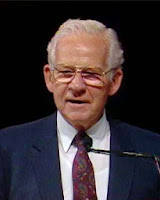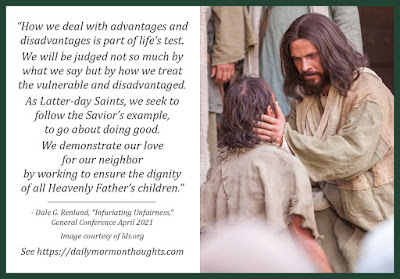"Charity is, perhaps, in many ways a misunderstood word. We often equate charity with visiting the sick, taking in casseroles to those in need, or sharing our excess with those who are less fortunate. But really, true charity is much, much more.
"Real charity is not something you give away; it is something that you acquire and make a part of yourself. And when the virtue of charity becomes implanted in your heart, you are never the same again. It makes the thought of being a basher repulsive.
"Perhaps the greatest charity comes when we are kind to each other, when we don't judge or categorize someone else, when we simply give each other the benefit of the doubt or remain quiet. Charity is accepting someone's differences, weaknesses, and shortcomings; having patience with someone who has let us down; or resisting the impulse to become offended when someone doesn't handle something the way we might have hoped. Charity is refusing to take advantage of another's weakness and being willing to forgive someone who has hurt us. Charity is expecting the best of each other."
- Marvin J Ashton, "The Tongue Can Be a Sharp Sword," General Conference April 1992, pp. 18-19
Click here to read the full talk
Elder Ashton was a kind and sensitive man in many ways. This advice, about how we treat one another, is a great example. I appreciated the introduction about what "real charity" is; not just the acts of public service, but the virtue that gets planted deep in our hearts and helps us understand our relationships to each other.
Even when we are wronged, charity helps us treat another person with love and forgiveness. What a wonderful gift! Since charity is the "pure love of Christ," we are blessed to see how He exemplified this quality in His life. Part of this is seeing differences but accepting and respecting them; recognizing weakness but working to help others; and truly expressing love to all around us.
(Compilation and commentary by David Kenison, Orem, Utah, 2022)
February 16, 2016
February 16, 2016

































